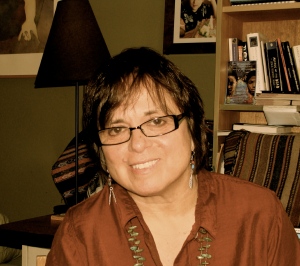Cherríe Moraga — Poetry
BALAS CHONAS
Upon the occasion of the Coming of Age Ceremony for the future chief of the Winnemem Wintu.
In recognition of their battle to protect the river and river rights of the Winnemem from appropriation by corporate interests.
July 5, 2012.
I
This is what matters about the Winnemem Wintu.
We matter.
As a damn-shackled river thrashes its swelling back
up against a concrete wall of shame,
Winnemem first daughters
in white over-sized tee shirts, the regalia of the common
and profound, dive for cooking stones.
For she who comes of age today, tradition
does not require skirt but knee-length basketball shorts
and a braid down her back, just like her brothers.
The Winnemem do have their traditional wear,
the chief knowing
its importance, the ceremonial mandate of it,
where we all rise to the occasion of the best
of what a whole nation can honor.
It is also, she knows, the opportunity for photo,
its cultural capital in the public eye:
a recognizable unrecognized nation of “real Indians”
layered in leather and shell work.
But their real work resides in the daily stand-
off the mean spirit of spineless enterprise
drowning in its own reservoired state.
“The man”
— BIA, Arrowhead Water, the US Forest Service —
could learn a thing or two from the salmon.
The Winnemem speak of it, life before the damn:
River so full, you could cross from bank to bank
on the silver backs of those fish.
What does it take to resist, to live outside violated treaties,
knowing that all those signed sheets of paper
were already laid
like infected blankets over everyone’s
great great auntie?
Yours, too.
No Western romance here.
Power is not played; it is worked.
A woman my age – soon sixty — grew into a chief.
She was the only one
left and picked from a small crowd
of a fistful of sisters.
I am a Mexican-American.
At our family reunions, the number of people tied
by blood alone is greater than the entire surviving
nation of the Winnemem Wintu.
Yet the Winnemem stand
for what has already been stripped from me,
from us: land, water, the right to original
ceremony.
Once, a human right;
we have nothing
to lose for this struggle.
Imagine this.
You’re a teenager
& a female looking over your chief’s shoulder
at a future she will not witness and you
can only imagine
its labor. Imagine
to be called in that way, to refuse to grow lazy
and acquiesce to oblivion.
Imagine that for our youth
that they would leave
their oaktown, sanjo, east los street corners
and go home
to make rebellion
from memory.
So, how do we come to see
that our own survival resides
on this small nation’s shoulders?
On these five feet of woman-chief,
shrinking in her daily refusal of food and fools;
on her moon-face niece,
whose black eyes are two small spinning disks
of hope (and fear)?
II
Standing by the riverbank,
a soul-hungry girl,
skinny and a million miles of loss
away from her own native navajo urges me:
“Dive for a stone. Take it back with you.”
So, I do, stumbling across the shallow waters
like an old woman, my bruising knees reddening
in the glacier-iced water.
I surface, like the Winnemem girls around me,
in this rite, rock in hand,
my small token.
It is the green of wet sea.
I am breathless.
Still, the rock and I are ambivalent companions.
I leave it everywhere I go, forgetful.
Later in the day, Auntie, she of the river people,
comes ‘round, and tells me, “I’ve got your rock. You left it back at the stone house.”
But I keep forgetting.
Until at the hour of our departure, long past midnight,
we go to bid our farewells to the chief and her familia.
Auntie appears, a lit face smiling in the small doorway of the trailer.
Her extended palm is the river pond
I had abandoned. My rock floats in it.
Embarrassed, I take it home
place it upon my altar.
Vow membership
to the detribalized/unrecognized/dropped-off-the-rolls indígenas.
Mi pueblo, 21st century.
 Cherríe L. Moraga is playwright, poet, and essayist whose plays and publications have received national recognition, including a TCG Theatre Artist Residency Grant, the NEA’s Theatre Playwrights’ Fellowship, and two Fund for New American Plays Awards. In 2007, she was awarded the United States Artist Rockefeller Fellowship for Literature and is a recipient of The American Studies Association Lifetime Achievement Award.
Cherríe L. Moraga is playwright, poet, and essayist whose plays and publications have received national recognition, including a TCG Theatre Artist Residency Grant, the NEA’s Theatre Playwrights’ Fellowship, and two Fund for New American Plays Awards. In 2007, she was awarded the United States Artist Rockefeller Fellowship for Literature and is a recipient of The American Studies Association Lifetime Achievement Award.
Moraga is the co-editor of This Bridge Called My Back: Writings by Radical Women of Color, which won the Before Columbus American Book Award in 1986. In 2011, Duke University Press published her most recent non-fiction collection, A Xicana Codex of Changing Consciousness: Writings 2000-2010. She is also the author of the now classic Loving in the War Years: Lo Que Nunca Pasó Por Sus Labios (1983/2003) and The Last Generation (1993), published by South End Press of Cambridge, MA. In 1997, she published a memoir on motherhood entitled Waiting in the Wings (Firebrand Books) and is presently completing a memoir on the subject of Mexican American cultural amnesia entitled Send Them Flying Home: A Geography of Remembrance. Moraga has also published three volumes of drama through West End Press of Albuquerque, New Mexico. They include: Heroes and Saints and Other Plays (1994), Watsonville/Circle in the Dirt (2002), and The Hungry Woman (2001). In Fall 2012, West End will publish a new volume of Moraga’s plays, including: Digging Up the Dirt and New Fire: To Put Things Right Again.
